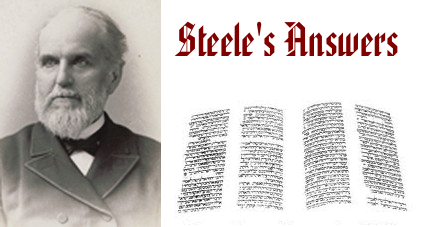— Ephesians i. 3, 4.
The doctrine of predestination always has reference to holiness. God, by an immutable decree, has made entire sanctification the goal attainable by all believers; from eternity He has determined that those who, by a free compliance with the conditions, are adopted into His family, "should be conformed to the image of His Son," not only in the distant future, but now, in the present life. "As He is, so are we in this world."
The broad line of demarcation between the children of God and the children of the devil lies in this one word, sin. "Whosoever has been born of God [and so continues] is not sinning, because His seed, the new principle of love, remaineth in him, and he is not able to be sinning, [as a habit,] because he has been born of God" [and so remains]. The significance of the Greek tenses is shown in the parenthetic words, the perfect tense denoting an act whose effect remains to the present time, and the present tense indicating an habitual or oft-recurring act.
A God-born soul is not in a sinning state, because he has admitted a new and dominant motive, antagonistic to sin, to take up its permanent abode behind his will. Its attitude cannot be hostile to the law so long as it is swayed by love to the lawgiver. He may in an unwary moment be surprised by some single act of sin, for which there is a merciful resort to the High-priest above. "If any man sin [aorist tense denoting a single act] we have a Paraclete with the Father, Jesus Christ the just." A perfectly holy soul, whether an angel in his first estate, or Adam in Eden, or a blood-washed believer, may fall away from his order by a decisive and permanent wrong choice, a choice which is the inexplicable mystery discussed for ages, the origin of sin. But John stoutly affirms that permanent sonship and continual sinning are contradictions which cannot be combined in one character. A man cannot be sober and drunken, honest and thieving, chaste and licentious, at the same time. But the temperate man may become an inebriate and die in the gutter; and the honest man become a thief and die in a prison.
How this stupendous perversion of the gospel of purity, that the sons of God are constantly sinning, became so widespread can be explained only on the theory that Satan himself has turned Bible expositor, teaching that "no man since the fall of Adam, even by the aid of divine grace, can perfectly keep God's law, but daily breaks it in thought, word, and deed." This fallacy of the Westminster Catechism still imposes upon intelligent minds, because they fail to see that the Adamic law has been replaced by the evangelical requirement of love as the fulfilling of the law. There is no sin where perfect love reigns. This may consist with innumerable defects, infirmities, and theoretical and practical errors. To a superficial observer these may look like sins, but a deeper inspection shows that they lack the essential characteristic, namely, the voluntary element. In ethics it is an axiomatic truth that volition is an attribute of sin as an act, or sin which entails guilt. Yet even involuntary deviations from rectitude need the atonement.
— Adapted from Mile-Stone Papers Part 1 Chapter 1.

No comments:
Post a Comment